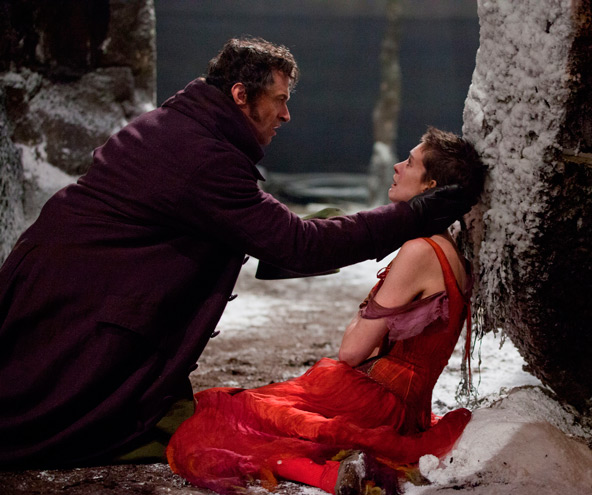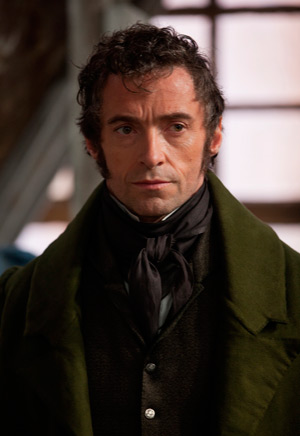

“Les Miserables” (2012)
Lavish adaptation of the worldwide musical stage sensation, based on the Victor Hugo novel and directed by Tom Hooper. Inspired by the kindness of a Catholic bishop (Colm Wilkinson), an ex-convict (Hugh Jackman) assumes a new identity and amends his life, becoming a benevolent mayor and factory owner, all the while evading the obsessive pursuit of his former jailer (Russell Crowe). When one of his workers (Anne Hathaway) is unjustly fired and forced into a life of prostitution, he pledges to raise her daughter (Isabelle Allen) as his own. Years pass, and the now-grown lass (Amanda Seyfried) falls for a young revolutionary (Eddie Redmayne) amid violent protests on the barricaded streets of Paris. A positive portrayal of the Catholic faith, with characters calling on God for grace and mercy, and seeking personal redemption while trying to better the lives of others, makes this rousing film especially appealing to mature viewers of faith. Scenes of bloody violence, a prostitution theme, nongraphic nonmarital sexual activity. Spanish titles option. The Catholic News Service classification is A-III — adults. The Motion Picture Association of America rating is PG-13 — parents strongly cautioned. Some material may be inappropriate for children under 13. (Universal Studios Home Entertainment; also available on Blu-ray)
In hindsight, it’s easy to see why “Les Misérables” didn’t win best picture at the Academy Awards this year.
Jean Valjean, played by Hugh Jackman, is essentially a pacifist. “The man of mercy,” as his foe eventually calls him, forgives 70 times 7. After his conversion in the first 15 minutes of the film, he relentlessly gives of himself to all he meets.
Jean Valjean doesn’t have a love interest. I take that back. Jean Valjean’s love interest is God, to whom he sings in the closing sequence, “Where you are, let me be.”
Jean Valjean, beaten, persecuted and abused, does not seek revenge. With the life of his persecutor in his hands, he says to him, “You are free, there are no conditions.”
The portrayal of prostitution does not glorify sex outside of marriage. Instead, it’s disturbing insofar as it demonstrates how loveless sex undercuts the dignity of the human person.
This is “Les Misérables.” This is not Hollywood. No wonder the Academy chose the far less provocative “Argo,” in which, essentially, Hollywood itself is the hero.
“Les Misérables” is provocative because Jesus Christ is provocative. Jean Valjean, like Jesus, makes us aware of our own fallen nature. Hollywood seems to lull us into accepting our sinful ways. It’s a miracle “Les Misérables” was nominated at all.
Victory
Jean Valjean spent 19 years serving hard labor for stealing a loaf a bread to feed his sister’s son. Javert, played by Russell Crowe and who represents the tyrannical French monarchy, continually tries to strip Valjean of his dignity. “24601,” he calls him — a number, not a person.
Valjean carries papers that identify him as criminal. He can’t get work. He’s spat on and beaten. Children throw rocks at him. There is no room for him anywhere.
Then he meets a bishop — the first sign of mercy and the only likeable character since the film began. The bishop — who we know as a representative of the Apostles — takes Valjean in and dines with his honored guest at his table.
That night, Valjean sneaks away with the bishop’s silver in his satchel. He’s captured and dragged back to the bishop’s house. Valjean had told the guards the bishop had given him the silver.
Shocking the guards and Valjean, the bishop says he did indeed give him the silver, adding, “But my friend you left so early, surely something slipped your mind?”
And then he takes the silver candlesticks from the table and gives them to Valjean. This transforms Valjean, and if we’re paying attention, it transforms us watching. It is Christ’s mercy manifest and it is — shortly after the film began — the pivotal moment in the entire work. Jean Valjean will never be the same. And isn’t that just how God’s mercy works?
“See in this some higher plan,” the bishop tells him after giving over the candlesticks. “You must use this precious silver to become a better man.”
Through the light on the candlestick, Valjean discovers who God created him to be, who God created all of us to be: saints — every last one of us. It is through beatitude that we find true joy.
“My life he claimed for God above,” Valjean sings of the bishop’s mercy. “Another story must begin.”
And so the life of a sinner ends and the life of a saint begins. Valjean tirelessly gives of himself to others throughout the remainder of the film. He cares for a prostitute in her last days, and takes her daughter as his own.
Over and over, Jean Valjean is presented with the opportunity to “get even” with his persecutor, Javert. And over and over he passes it up. He forgives. He loves his enemy. This is heroic mercy.
Valjean learns another man has been caught and will be punished in his name. Will Valjean, who’s created this new life for himself, turn himself in so that this other man might go free?
“If I speak I am condemned. If I stay silent, I am damned.”
Valjean, who once was a slave to the French government, is now a slave to truth. Over and over, he sings, “Who am I?” He’s calling out his true, saintly self, called to be a vessel of God’s mercy.
Revolution
The revolution against a tyrannical French government is a side story to Valjean’s redemption. It seems to be simply the setting for the older Cosette, played by Amanda Seyfried, to fall in love with Marius, played by Eddie Redmayne. Marius is a rich kid who joins the band of revolutionaries.
Valjean risks his life for Marius, his adopted daughter Cosette’s future husband. He gives his life at this point in a seemingly effortless way, so ingrained in his habit of dying to self. It’s as if he isn’t giving his life anymore because he’s already surrendered his life to God. The yoke is light, the burden is easy, with grace from above.
Because of Valjean, Marius survives the battle in which his companions were slaughtered. When Marius sings, “Don’t ask me what your sacrifice was for,” he seems to question the point in the violent resistance altogether.
Shortly before saving Marius, Valjean has his foe, Javert, at the end of a knife. He lets him go, and Javert sings, “The man of mercy comes again.” Later, moments before he kills himself, Javert sings, “Vengeance was his and he gave me back my life.”
And this, this heroic mercy, is the true revolution.
“Les Misérables” — which may as well be called “the sinners” — stands out because it more than any other Oscar-nominated picture demonstrates God’s love and mercy. Jean Valjean inspires us to ask ourselves, “Who am I?” We are called to be saints.
“And remember the truth that once was spoken, to love another person is to see the face of God.”






